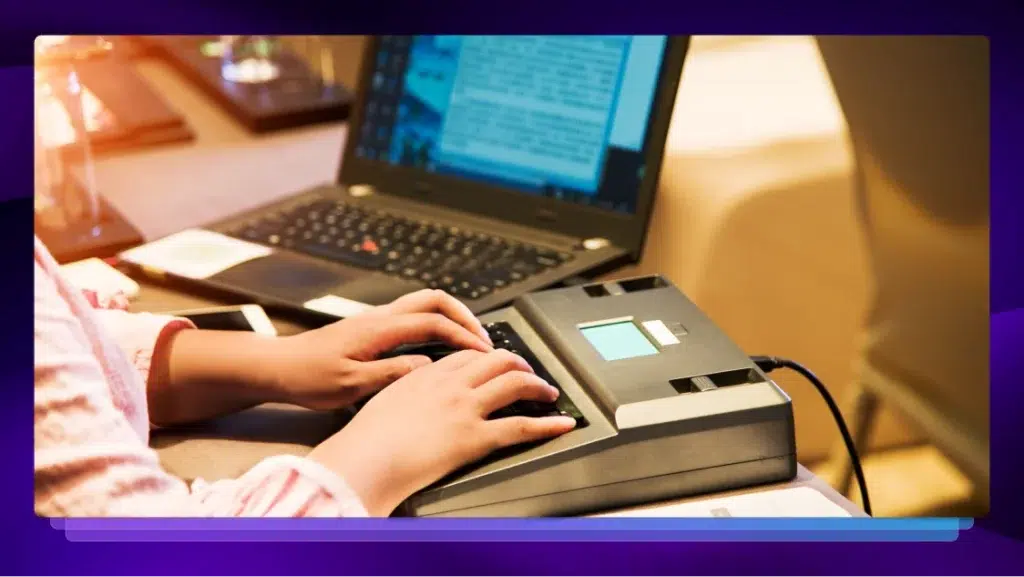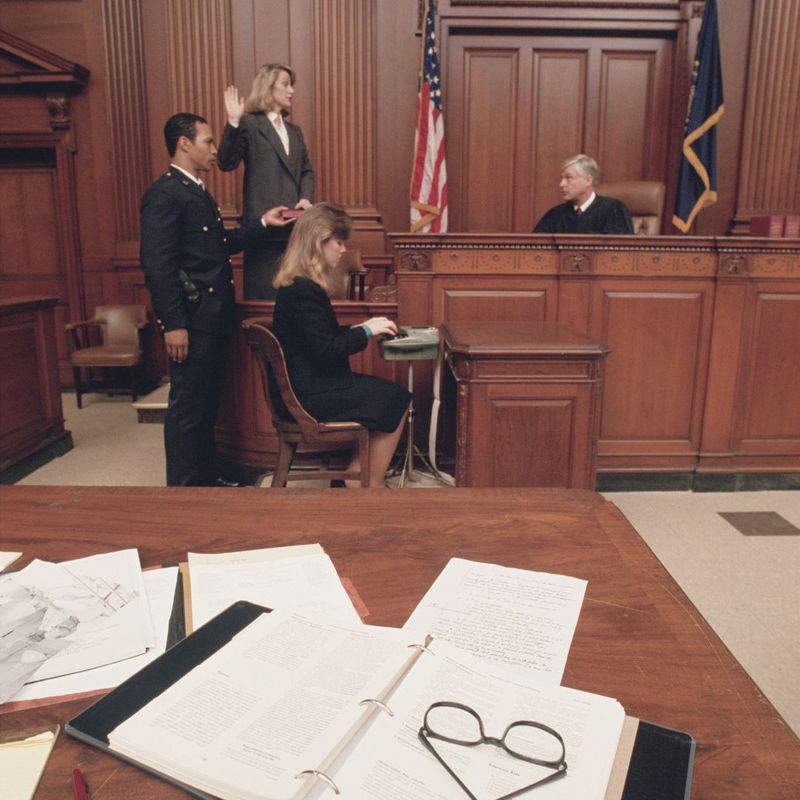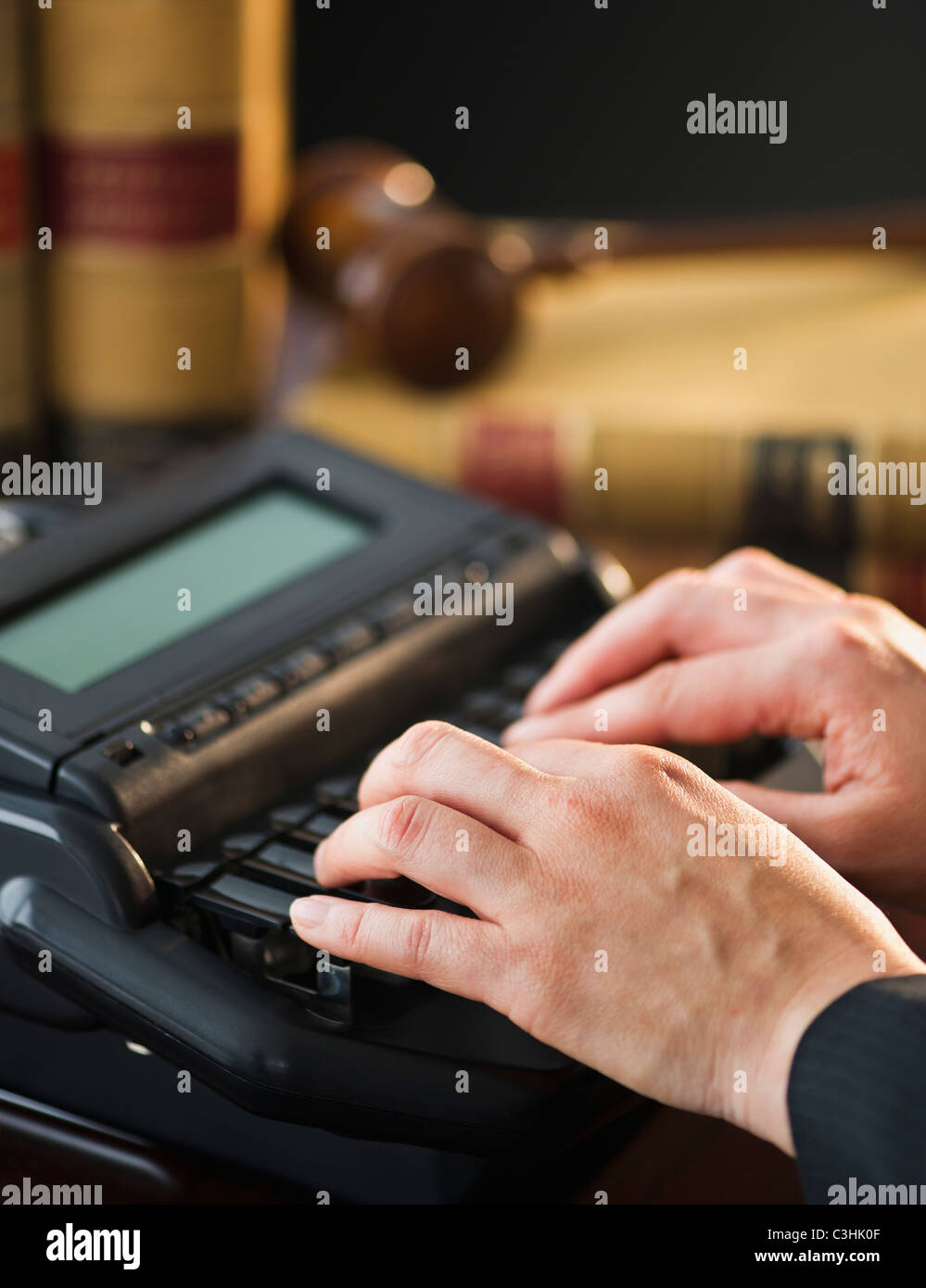Court Typist Certification: What You Should Know to Get Started
Court Typist Certification: What You Should Know to Get Started
Blog Article
Discover the Essential Skills and Duties of a Court Typist in Today's Lawful Landscape
As a court typist, you hold a critical setting in the legal system. Your skills exceed simply keying; they entail understanding complex legal terms and procedures while ensuring precision in every document. You work together carefully with attorneys and courts, making your duty indispensable for efficient communication. What certain abilities do you need, and how can you adjust to the ever-evolving technological landscape? Let's explore this better.
The Function of a Court Typist in the Judicial System
As the backbone of the judicial system, a court typist plays a crucial role in assuring that lawful process are precisely documented. You're liable for recording everything from witness testimonies to judges' judgments, capturing every detail with precision. Your job aids keep a long-term and clear document of court tasks, which is important for future reference and appeals.In the court room, you're commonly the unhonored hero, silently ensuring that all talked words end up being composed records. You keep privacy, recognizing the sensitive nature of legal issues. You likewise work together carefully with staffs, judges, and legal representatives to ensure the smooth circulation of details. By functioning successfully under stress, you add to the overall efficiency of the judicial procedure. Your interest to detail and dedication to accuracy not only copyright the stability of the court however also sustain the wider pursuit of justice in culture.
Crucial Abilities Needed for Court Typists
Court typists need a distinct blend of skills to master their crucial role within the judicial system. Firstly, you should have superb keying skills, commonly attaining rates of 70 words per minute or even more. Accuracy is essential; also a small mistake can bring about substantial misconceptions in legal files. You'll additionally require solid focus to detail, making certain every word is recorded correctly.Additionally, great organizational abilities are crucial for handling several cases and records successfully. Being tech-savvy is important, as you'll utilize various software programs for data processing and paper monitoring. Solid interaction abilities aid you engage with judges, attorneys, and various other court workers effectively.Lastly, a sense of professionalism and reliability and privacy is a must, as you'll manage delicate information daily. By developing these abilities, you'll be well-prepared to add substantially to the court atmosphere.
Comprehending Lawful Terms and Procedures
As a court typist, you require to grasp vital lawful terms and treatments to perform your task effectively. Understanding these concepts not only helps you record precisely but also ensures you can follow the flow of court process. Allow's discover the crucial lawful vocabulary and an overview of court procedures you should recognize.

Key Legal Terms
Understanding vital legal terms is essential for anyone operating in a court room environment. You'll regularly experience terms like "complainant," which refers to the individual starting a lawsuit, and "defendant," who reacts to the accusations. Understanding the distinction in between "civil" and "criminal" cases helps you realize the context of the process. Knowledge with "subpoena" assurances you understand the legal papers engaging witnesses to testify. Additionally, terms like "proof" and "testament" are crucial, as they relate straight to the info offered in court. Understanding these terms not just enhances your efficiency as a court typist however likewise guarantees that you contribute to the accuracy and clarity of legal documents. Your role pivots on exact terminology, so do not take it lightly!
Court Procedures Review
Experience with key lawful terms sets the stage for grasping court treatments. Understanding exactly how a court features is essential for any kind of court typist. You'll come across processes like arraignments, where defendants hear fees, and motions, which are ask for a court ruling. Acquaint on your own with the roles of clerks, courts, and attorneys, as each plays a vital component in proceedings. Knowing the flow of a test-- from court option to shutting arguments-- helps you properly capture the proceedings - court typist. Furthermore, understanding the value of maintaining a impartial and accurate record can't be overemphasized. By understanding these components, you'll enhance your performance in recording crucial court tasks and contribute considerably to the legal procedure. Your role is crucial in preserving the stability of court documents
The Impact of Modern Technology on Court Typing
Modern technology's transformed court typing in substantial methods. With electronic transcription tools, you can raise effectiveness and accuracy, making your task much easier than ever. And also, remote court proceedings have altered exactly how you approach your work, needing versatility to new styles and innovations.
Digital Transcription Devices
As digital transcription tools remain to progress, they're changing the method court typists do their obligations. These tools browse this site enhance the transcription procedure, permitting you to record spoken words accurately and efficiently. With voice recognition software, you can transcribe real-time procedures, lowering hand-operated input and lessening errors.Moreover, cloud-based systems make it possible for very easy accessibility to documents, so you can work collaboratively with lawful teams and assure everyone's on the same page. Automated format attributes conserve you time on repetitive jobs, allowing you focus on material quality.Additionally, digital tools enhance safety, protecting delicate details with encrypted storage space and regulated accessibility. By embracing these technologies, you can enhance your performance and preserve the high standards required in the lawful area.
Remote Court Proceedings
The increase of remote court process has greatly changed the landscape for court typists. You currently rely upon innovation to capture and record live hearings from your home or workplace. Knowledge with video clip conferencing platforms is vital, as you'll need to browse them effortlessly to ensure an accurate record. You'll also need to handle audio quality, as background sound or connection issues can disrupt your work. Furthermore, remote procedures require fast reasoning; you may need to clarify statements or demand repeats in real-time. Staying arranged and reliable is critical, as target dates remain tight. Accepting these technical innovations not only improves your abilities yet also assures you stay an indispensable property in today's evolving legal environment.
Precision and Focus to Information in Transcription
Accuracy and interest to information check are essential in transcription, specifically for court typists. court typist. Every word counts when you're recording lawful procedures. A solitary blunder can change the definition of a declaration, potentially influencing the end result of a situation. You have to listen meticulously, assuring that you capture every subtlety and inflection in the audio speaker's voice.Your capability to catch typos and grammatic errors is essential. You don't just kind; you validate that the last document is a specific representation of what was said in court. This calls for a keen eye and a thorough understanding of legal terminology.Moreover, you'll require to be familiar with different accents and speaking designs, as court rooms can hold a variety of audio speakers. By refining your precision and attention to detail, you'll maintain the integrity of legal documents and contribute noticeably to the judicial process. Your diligence around truly makes a distinction

Time Monitoring and Organizational Skills
While handling numerous tasks, effective time administration and business skills are vital for court typists. You'll often handle different deadlines, from recording court proceedings to preparing legal documents. Prioritizing your workload is vital; determine urgent tasks and tackle them initially to ensure prompt submissions.Organizational skills enter into play when you're arranging through instance records, notes, and data. Keeping everything neatly categorized not only saves time however also lessens the danger of mistake. Utilizing devices like calendars, to-do checklists, or specialized software can help you stay on track and handle your time effectively.Moreover, establishing specific goals for each job session can improve your productivity. Damage larger projects into smaller jobs to make them much more workable. By refining these abilities, you'll not only enhance your efficiency however additionally contribute significantly to the smooth procedure of the lawful process, guaranteeing every little thing runs like clockwork.
Proceeding Education and Professional Development Opportunities
Buying your skills does not stop with time monitoring and company. As a court typist, you'll find that continuing education and professional growth are important to remaining affordable in the lawful field. Try to find workshops or on-line training courses concentrating on advanced typing methods, legal terminology, and transcription software program. These can develop your skills and aid you adjust to the most recent technologies.Networking is just as vital. Join professional companies like the National Court Reporters Association (NCRA) or local lawful organizations. They commonly use resources, training sessions, and seminars that can improve your understanding and attach you with peers.Don' t forget concerning certification programs that can increase your reputation and marketability. Remaining upgraded with the most up to date fads and ideal practices in lawful documentation will enhance your performance and accuracy, making you an invaluable asset to any kind of legal group. Purchase your development, and you'll enjoy the incentives throughout your occupation.
Frequently Asked Inquiries
What Is the Common Income Variety for a Court Typist?
A court typist's typical income varieties from $30,000 to $55,000 each year, depending on experience and area. You could also find chances for development with additional abilities, bring about boosted pay in the lawful area.

Are Court Typists Required to Have a Lawful Degree?
Court typists do not require a legal level, however having one can be valuable. You'll usually locate that solid inputting skills and expertise of lawful terms are more vital for success in this duty.
What Are the Job Hours for a Court Typist?

How Do Court Typists Guarantee Confidentiality in Their Work?
You ensure privacy by firmly dealing with delicate records, utilizing encrypted software, and adhering to rigorous protocols. You remain mindful of privacy regulations and only share info with authorized personnel, maintaining count on in the judicial process.
Can Court Typists Job From Another Location or Freelance?
Yes, you can function remotely or freelance as a court typist, especially if you have dependable innovation and a safe and secure setting. Lots of lawful professionals now embrace remote job, using adaptability and chances for independent typists. As the foundation of the judicial system, a court typist plays an essential function in assuring that lawful process are accurately documented. As a court typist, you require to grasp vital legal terms and treatments to do Visit Website your job effectively. Understanding these terms not just improves your efficiency as a court typist however likewise ensures that you add to the precision and quality of legal records. The surge of remote court procedures has actually significantly changed the landscape for court typists. As a court typist, you'll locate that proceeding education and expert development are vital to staying affordable in the lawful area.
Report this page